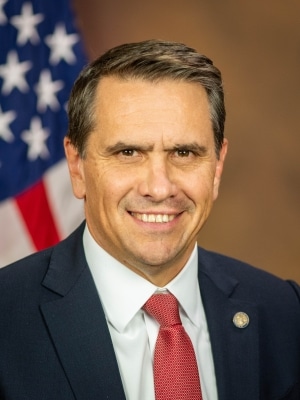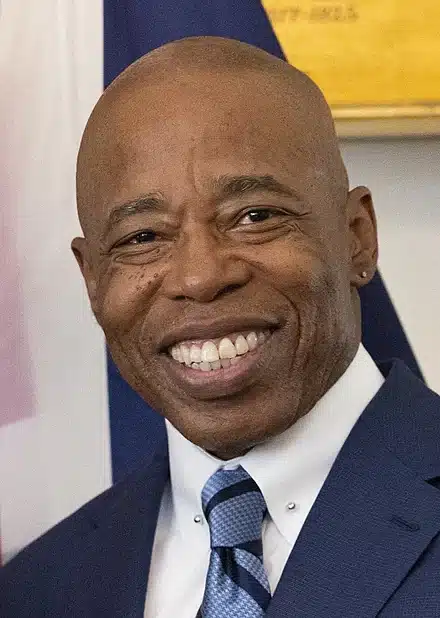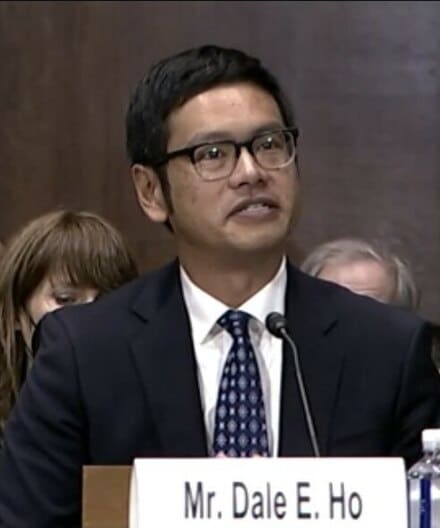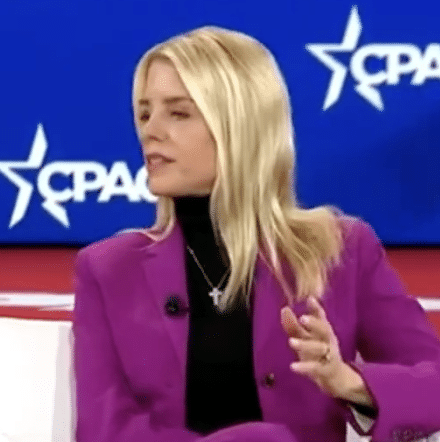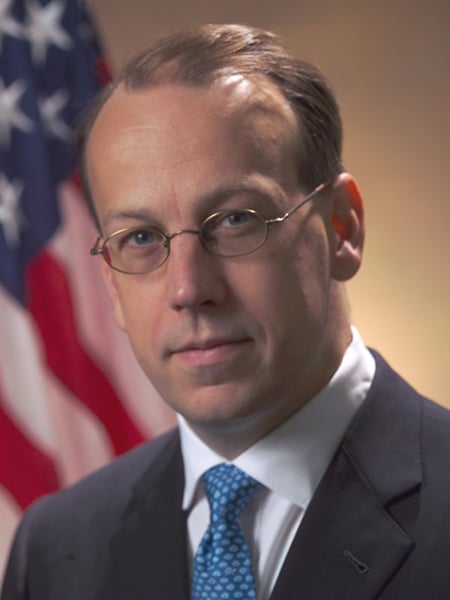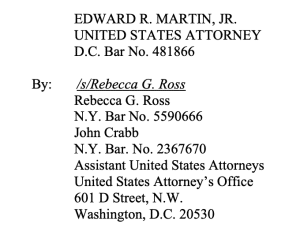Unsurprisingly, in his amicus filing, Paul Clement strongly recommended that Judge Dale Ho should dismiss the Eric Adams prosecution with prejudice. The most remarkable thing about Clement’s memorandum, as first noted by Josh Gerstein, is that Clement did not mention the Mike Flynn case, even while making claims directly undermined by it. (Adams’ own filing mentions Neomi Rao’s dissent in Flynn, and Emil Bove invoked it inaptly to say that because the amicus in Flynn did not seek discovery, it means no amicus would need to.)
Bove’s submission, signed as well by newly-confirmed Todd Blanche, is surprising, but not just for its inapt citation of Flynn.
Filed in the wake of multiple questions about his own ethical misconduct, Bove largely shifts a key premise of his own motion to dismiss, that it should be dismissed because of an appearance of impropriety. He largely replaces that justification, one of two made for dismissing the Adams case, to weaponization alone.
The first sentence of the section addresses his excuses for dismissing the case cites a paragraph that mentions only appearance of impropriety, then the transcript where he mentions weaponization but supports it by claiming an appearance of impropriety.
Dismissal is required, on consent, based on the Department’s conclusion that this prosecution reflects an improper weaponization of the criminal justice system, which has given rise to “appearances of impropriety and risks of interference with the 2025 elections in New York City.” Mot. ¶ 5; see also 2/19/25 Tr. 23.
But the balance of the passage relies entirely on his claim of weaponization, citing to Trump’s Executive Order making false claims that Biden politicized DOJ, and eventually citing an appellate decision in the Blagojevich case that threw out those quid pro quos that involved trading of official positions, but not those involving personal benefit (seemingly suggesting that Eric Adams would get no personal benefit from dismissal).
In this case, the Department has exercised the capacious prosecutorial discretion that supports the Motion pursuant to the anti-weaponization policy articulated by President Trump on his first day in office. Specifically, Executive Order 14147, entitled Ending the Weaponization of the Federal Government, sets forth the following policy: “It is the policy of the United States to identify and take appropriate action to correct past misconduct by the Federal Government related to the weaponization of law enforcement . . . .” 90 Fed. Reg. 8235. The express “purpose” of the policy is to “ensure accountability for the previous administration’s weaponization of the Federal Government against the American people,” which included conduct “oriented more toward inflicting political pain than toward pursuing actual justice or legitimate governmental objectives.” Id.
It cannot be denied that President Trump’s anti-weaponization policy is in the public interest as an important reform in response to recent abuses of the criminal justice system. The purpose of the policy, like the Petite policy, “is to protect the individual from any unfairness.” Rinaldi, 434 U.S. at 31. “The defendant, therefore, should receive the benefit of the policy whenever its application is urged by the Government.” Id. Here, for the reasons set forth in the Motion and at the February 19, 2025 hearing, that means the pending charges must be dismissed.
[snip]
As a legal matter, the Department’s conclusion that dismissal would serve the public good by deterring weaponization, and promoting Executive Branch national security and immigration objectives, is entirely proper. Every action that a diligent public servant takes should be designed to advance the public good, which is what the Motion seeks to achieve. If taking such steps were treated as the equivalent of a personal gift or bribe, whether under the ethics rules or bribery laws, government would literally grind to a halt. That is why “a proposal to trade one public act for another, a form of logrolling, is fundamentally unlike the swap of an official act for a private payment.” United States v. Blagojevich, 794 F.3d 729, 734 (7th Cir. 2015).
Remember: Judge Ho ruled that the publicity around the case did not violate local rules, and Adams never even claimed selective prosecution. This is Bove saying he knows better and Judge Ho has no say in the matter.
Having thus claimed that Trump’s own declaration that prosecutions against him were unfair can, in turn, taint entirely different prosecutions, his defense attorney then tries to flip his own alleged unethical conduct. Both in the introduction and in a long follow-up section (together making up about 8 pages of 18), Bove spins Danielle Sassoon and Hagan Scotten’s refusal to do something they viewed to be unethical as itself misconduct.
He does so in two ways. First, and most alarmingly, he suggests that resigning rather than taking an action they deemed unethical amounted to misconduct. Consider the logic of these two paragraphs (Bragg v. Jordan is the Second Circuit opinion holding that Mark Pomerantz had to respond to a Jim Jordan subpoena, sustaining Bove’s paranoia and Trump’s conspiracy theories about him):
The decisions by U.S. Attorney-2 and AUSA-1 to resign, rather than carry out their obligations under the Department’s chain of command, are not a basis to question the Motion. Each U.S. Attorney’s authority is derivate of the Executive Power that the President has delegated to the Attorney General. See 28 U.S.C. §§ 503, 509, 515. So too is the residual power of AUSAs, who are removable by the Attorney General. See 28 U.S.C. § 542. The Attorney General explained on February 5, 2025 that “it undermines the constitutional order and deprives the President of the benefit of his lawyers” when the Department’s attorneys “refuse to advance good faith arguments . . . .”3 SDNY’s prosecution team and Executive Staff did just that, preferring “political theatre” [sic] over their obligations to the Constitution and the public. Bragg v. Jordan, 669 F. Supp. 3d 257, 275 (S.D.N.Y. 2023).
SDNY has taken a markedly different tack in other cases by conceding that the office is bound by the Department’s senior leadership. In Blaszczak, SDNY felt “constrained” to “confess error at the direction of the Solicitor General’s Office” and to ask the Second Circuit to “set aside” trial convictions on several fraud counts. ECF No. 453 at 8, No. 18-2811 (2d Cir. Apr. 2, 2021); see also id. at 2 (noting that SDNY was “constrained to follow” the Department’s position); id. at 12 (“[T]he Government is constrained to concede that the § 641 object of each conspiracy was legally invalid. . . .”). In Paracha, an AUSA told the court that, because the dismissal motion had been “approved at the highest levels of the Department of Justice,” “w[e] do not have authority to make any changes to that document.” ECF No. 197 at 7 (emphasis added), No. 03 Cr. 1197 (S.D.N.Y. Dec. 20, 2019). Here, too, the SDNY prosecution team lacked authority to countermand a decision authorized by the Attorney General. Their misconduct is not a basis to extend this litigation, much less deny the Motion. [my emphasis]
3 https://www.justice.gov/ag/media/1388521/dl?inline.
In this passage, Bove presents what is the proper ethical decision — to end a relationship with a client if they ask you to do something you cannot ethically do — as instead misconduct (and he calls it misconduct even though, as he says elsewhere, Sassoon and Scotten are “the subjects of an ongoing investigation at the Department,” making it clear, on the same day the head of Office of Professional Responsibility was sacked, that he has prejudged the affair).
He does so while invoking the memo Pam Bondi issued last month, demanding that all lawyers of the Department be willing to “vigorously defend[] presidential policies and actions against legal challenges on behalf of the United States.” The consequence Bondi lays out for failing to zealously (a word repeated four times) defend Trump’s views is discipline or termination.
It is therefore the policy of the Department of Justice that any attorney who because of their personal political views or judgments declines to sign a brief or appear in court, refuses to advance good-faith arguments on behalf of the Administration, or otherwise delays or impedes the Department’s mission will be subject to discipline and potentially termination, consistent with applicable law.
But that’s not what happened here: Sassoon and Scotten resigned. (Indeed, Bove formally treated Sassoon’s offer, made to AG Bondi, to resign as such, rather than firing her while she remained an employee, which he could have done).
In other words, Bove is robbing Sassoon and Scotten of the ability to resign to avoid an unethical act. He’s saying the mere act of doing so — the act of making the ethically correct decision as a lawyer — amounts to misconduct.
And from there, he document dumps a bunch of communications Sassoon, Scotten, and some other AUSAs on the case sent, a veritable Twitter Files dump in a legal filing, clearly misrepresenting the context of at least some of them. (I’ve put the references to all eight Exhibits below.)
For example, Bove quotes from a text exchange three days after the election in which someone asks the very conservative Hagan Scotten if he’s going to go after a judgeship now that a Republican won. Scotten replies, “Got to convict Adams before I can think about anything else.” Bove quotes this three times!! But it appears to say precisely the opposite of what Bove implies — he uses it to slam Scotten (along with Sassoon) as “aggressive and careerist.” But instead it shows that Scotten was focused on what he was doing; he wasn’t rushing from what Bove claims is a dogshit prosecution to find a lifetime promotion. Plus, Bove claims that Scotten’s text, “illustrates why [Scotten] was later interested in using public filings to send messages to President Trump,” which makes no sense at all; it was already clear by the election that Trump was sucking up to Adams. If Scotten wanted to suck up to Trump, he would have ditched the prosecution ASAP, possibly even (as Bove himself did) rush to represent Trump in two criminal cases for attacking the country, in hopes of political gain.
Similarly, Bove treats a draft of the letter Sassoon ultimately sent to Pam Bondi on February 12 as a big gotcha, pretending that there’s no difference between “having the authority” to dismiss charges with “having a valid basis to do so.”
Four of the documents Bove cites (Exhibit B, Exhibit C, Exhibit G, and Exhibit H) discuss the drafting of this court filing, which was in turn a response to this inflammatory filing from Adams’ attorneys. The comments all seem to react to the headache Damian Williams had caused by promoting himself and writing an oped opposing corruption — though Adams’ letter make ridiculous claims that Williams was trying to get into the Mayoral race with just months to spare. Adams’ letter effectively says that Williams’ anti-corruption stance as US Attorney, one that targeted both overt Democratic donor Sam Bankman-Fried and Robert Menendez, was partisan. None of the comments supports Adams’ point — that there was some impropriety with the prosecution or prejudice for Adams before a jury. Nor do they conflict with Judge Ho’s opinion on Damian Williams’ op-ed, which is that it was a stretch to suggest it targeted Adams at all and certainly didn’t violate local rules.
Although Mayor Adams does not request relief under Local Rule 23.1, the Court notes that, after carefully reviewing Mr. Williams’s op-ed, the op-ed does not contain any statements that run afoul of the Rule’s prohibitions. In the op-ed, Mr. Williams provides hyperlinks to several prosecutions brought during his tenure as U.S. Attorney, including those of federal and state elected officials, but none concern Mayor Adams. In fact, the majority of the statements in the oped that Mayor Adams claims are problematic concern New York State rather than New York City politics. For example, Mayor Adams highlights Mr. Williams’s statements that “[t]he ability to raise obscene sums of money for a campaign is precisely the wrong bottleneck to elected office,” and that “[i]t reeks of pay-to-play corruption and is offensive to most New Yorkers . . . ” Jan. 18 Letter at 2 (quoting Williams’s op-ed). But those sentences are found in a paragraph lamenting the ability of candidates “to raise money from individuals or entities with business before the state,” opining that “[t]he state’s new matching funds program is woefully inadequate,” and arguing in favor of “a truly transformative public financing system for state elections. . . ” Id. (emphases added). They do not appear to be directed at New York City politics generally or at this case specifically.
There is one sentence in the op-ed stating that “[t]he public reporting alone paints a picture” that “America’s most vital city is being led with a broken ethical compass,” id. at 1, which could plausibly be read to be a reference to Mayor Adams (among others). This particular statement, however, “do[es] not cross the line drawn by [Local] Rule 23.1 in the sense that [it] do[es] not, by [itself], constitute opinions as to the Defendant[’s] guilt, and [is] not otherwise the type of statement[] proscribed by the rule.” United States v. Smith, 985 F. Supp. 2d 506, 539 (S.D.N.Y. 2013) (citing Local Rule 23.1(d)). Nor does the statement “go[] beyond the public record.”
There’s even a clear concern not to dictate anything to the incoming Main Justice team nor to piss off Trump, precisely the kind of deference Bove is demanding.
Plus, Bove omitted something from Sassoon’s letter to Bondi. Williams had a minimal role in the case.
As Mr. Bove’s memo acknowledges, and as he stated in our meeting of January 31, 2025, the Department has no concerns about the conduct or integrity of the line prosecutors who investigated and charged this case, and it does not question the merits of the case itself. Still, it bears emphasis that I have only known the line prosecutors on this case to act with integrity and in the pursuit of justice, and nothing I have learned since becoming U.S. Attorney has demonstrated otherwise. If anything, I have learned that Mr. Williams’s role in the investigation and oversight of this case was even more minimal than I had assumed. The investigation began before Mr. Williams took office, he did not manage the day-to-day investigation, and the charges in this case were recommended or approved by four experienced career prosecutors, the Chiefs of the SDNY Public Corruption Unit, and career prosecutors at the Public Integrity Section of the Justice Department. Mr. Williams’s decision to ratify their recommendations does not taint the charging decision
Emil Bove went fishing in the prosecutors personal emails (the other two AUSAs on the team were put on paid leave Friday, ensuring they lost access to these communications before Bove filed this), hoping to find corroboration for his false claims about politicization, and came up short. So instead, he simply made up they made Sassoon and Scotten look like careerists, when nothing he submitted supports that at all.
Twitter Files. An attempt to smear two prosecutors for making an ethical decision, precisely the basis of several ethical complaints raised against Bove himself.
Understand, too, Bove is playing a transparent game. Publishing these communications is a privacy violation, little different than the release of the Strzok and Page texts which DOJ subsequently determined was unlawful. Bove as much as concedes the point in his request asking to seal the exhibits.
In the Response, the Department sought to strike an appropriate balance between the public’s right of access, and the privacy interests of the attorneys at issue, by anonymizing the participants to communications. The participants are the subjects of an ongoing investigation at the Department.
[snip]
Even to the extent inferences regarding the identities of certain participants could be drawn based on connections to public reporting, that is not the case for each of the individual participants.
Of course, filing something under seal provides cause for the press to demand to have it unsealed under precisely the same “public right of access.” It won’t be sealed for long. And the only mystery about the identities of AUSAs 2, 3, and 4 is which is which member of the now-suspended prosecution team.
None of this helps Bove’s case. None of this disproves there was a quid pro quo. None of this presents any evidence that Sassoon or Scotten had any question about the ethics of their decision.
All it does is confirm that when Bove says he’s fighting weaponization, he means he’s going to go after anyone who gets in his way of weaponizing DOJ.
Exhibit A: Part of a package of communications Danielle Sassoon attached to an email; Bove claims that all are related to her resignation (it’s not clear they are)
On February 12, 2025, the recently-resigned Acting U.S. Attorney (U.S. Attorney-2) sent herself a draft letter stating that she was “personally disappointed in [her] predecessor’s self-serving actions after his departure. . . .” Ex. A,
[snip]
Attorney-2 sent an email attaching draft materials relating to her anticipated resignation. Ex. A. One of the documents was named “Adams PR,” i.e., press release, which suggests that she was already planning to publicize her resignation. Ex. A, Attachment 1. A another document, styled as a letter to the Attorney General, included the assertion that U.S. Attorney-2 “was personally disappointed in my predecessor’s self-serving actions after his departure, including the creation of a personal website.” Ex. A, Attachment 3. The draft letter also noted, in highlighted text, that “the Attorney General has the authority to order the dismissal of pending charges.” Id. On the day after sending the drafts, U.S. Attorney-2 emailed a letter to the Attorney General that omitted this language and claimed falsely: “The Government Does Not Have a Valid Basis To Seek Dismissal.”
Exhibit B: A discussion about how to respond to Eric Adams’ complaints about Damien Williams’ public comments
prior to making the public claim that only a “coward” or “fool” would sign the Motion, a recently-resigned AUSA from the SDNY prosecution team (AUSA-1) wrote the following regarding the letter that SDNY filed with the Court on January 22, 2025: “[U.S. Attorney-1] obviously has political ambitions, and I think suggesting we doubt that just costs us credibility.” Ex. B at 2
[snip]
AUSA-1 also wrote that it was “pretty plausible” to him that U.S. Attorney-1 “had a political motive in bringing this case.” Id.
[snip]
AUSA-1 pushed back. “I know that none of us were motivated by [U.S. Attorney-1’s] political aspirations, but I don’t think any of us know for sure what motivated [U.S. Attorney-1].” Id. AUSA-1 added the following comments in the draft of the letter:
- “[T]he point to me is just to separate ourselves from [U.S. Attorney-1].”
- “To me the point about the statements not naming EA feels a little too lawyerly—almost a technicality in this context since [U.S. Attorney-1] was obviously referring to EA [in the op-ed].”
- “I don’t want to ask anyone to reject the theory that [U.S. Attorney-1] had a political motive in bringing this case. Seems pretty plausible to me.”
- “I don’t want to say anything that picks a fight with EA’s accusation of political ambitions against [U.S. Attorney-1]: [U.S. Attorney-1] obviously has political ambitions, and I think suggesting we doubt that just costs us credibility.” Ex. B.
Exhibit C: Another discussion about how to respond to Eric Adams’ complaints about Damien Williams’ public comments
AUSA-1 explained that he hoped to “distance” the SDNY prosecution team from U.S. Attorney-1, “enough that [Judge] Ho and [President] Trump will know we don’t approve of what he did, but not so much that we magnify the scandal.”
[snip]
On January 19, 2025, AUSA-1 circulated a draft of the letter SDNY ultimately filed on January 22, 2025, in which the prosecutors argued—wrongly—that Mayor Adams’ “criticism of the article and the fact of its publication are beside the point.” ECF No. 102. In the email attaching the draft of the letter, AUSA-1 explained, “[b]asically, I tried to . . . distance us from [U.S. Attorney-1] enough that [Judge] Ho and [President] Trump will know we don’t approve of what he did, but not so much that we magnify the scandal.” Ex. C. In response to the draft, AUSA-3 argued, “I think we want to create distance between those prosecutors and the [] US Attorney.” Id. Another AUSA on the SDNY prosecution team (AUSA-4) added, “I agree that we should create some space from [U.S. Attorney-1], but I also think we should avoid anything that looks like us fighting with [U.S. Attorney-1] (which would be counterproductive).”
As the SDNY prosecution team continued to debate the substance of the draft letter, AUSA4 suggested that the prosecutors should argue that Mayor Adams was “wrong about his claim that our prosecution is motivated by [U.S. Attorney-1’s] political interests.” Ex. C.
Exhibit D: A November 8 text in which Scotten said he wasn’t going to pursue a judgeship right away
Just days after the 2024 election, in response to a text message asking if it was “time” for AUSA-1 to “take a seat on the bench,” AUSA-1 responded: “Got to convict Adams before I can think about anything else.”
[snip]
On November 8, 2024, AUSA-1 received a message with the following question: “You think it’s time to take a seat on the bench? Lol.” Ex. D. AUSA-1’s response included, “Got to convict Adams before I can think about anything else.”
[snip]
It is thus apparent from the context that, just as AUSA-1 hoped to convict Mayor Adams as the last notch in his belt before he took a “seat on the bench,” Ex. D,
Exhibit E: A July 17, 2024 discussion about trial strategy.
At least one of the prosecutors was as aggressive and careerist as U.S. Attorney-1. For example, on July 18, 2024, AUSA-1 exchanged messages with another AUSA on the SDNY prosecution team (AUSA-2) about efforts to “exclude” a “defense witness” in this case. Ex. E. AUSA-1 remarked that an “invocation is better” than “[l]etting him come in and refuse cross.”
Exhibit F: A September 5, 2024 comment from one of the other AUSAs about how they portrayed the influence relationship
On September 5, 2024, another AUSA on the SDNY prosecution team (AUSA-3) acknowledged in a text message to AUSA-1 that “we did a lot of gymnastics around the influence point” in the Indictment, and argued that “maybe making him the one exploiting the corrupt relationship works better.” Ex. F
Exhibit G: A January 21 response to a draft of the filing
Later on January 21, AUSA-1 circulated a revised version of the draft with comment bubbles that included:
- With respect to the “beside the point” sentence that was ultimately included in the letter, AUSA-1 noted that U.S. Attorney-2 “suggested this sentence, which makes the point less oblique—her objection to the prior version—while in my view still preserving our effort to distance ourselves from the article.”
- AUSA-1 also noted: “I think we have a sufficiently strong ending without the prior ending (any US attorney would signed) which [U.S. Attorney-2] and others felt might be read as an attempt to hem in the new crew at main justice before they had a chance to weigh in on the case.”
Exhibit H: Another message about the January 21 filing
In a separate message, AUSA-1 asserted that he preferred a strategy that “buys us more credibility by first making clear we’re not defending the [U.S. Attorney-1] article before then going on the attack.” Ex. H



